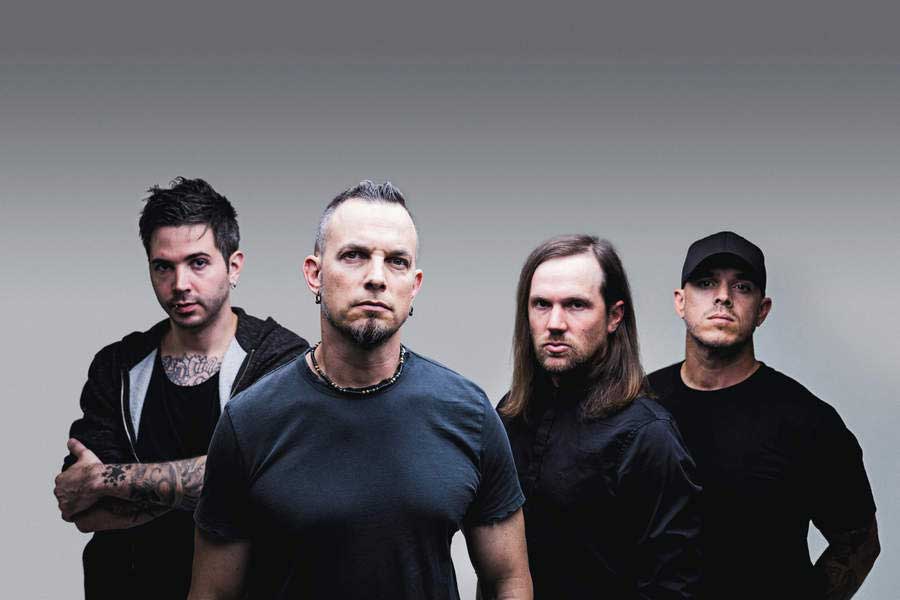You can set your watch by Mark Tremonti. For three decades the guitarist has run his career like a military campaign. There’s the album and tour cycle, as regular as clockwork. The precise guitar solos, never a note missed. And, sure enough, here he is on Zoom at eighteen hundred hours, black-clad and as close-cropped as a Navy Seal (if a little longer and greyer of beard).
“My kids have made fun of me for cutting my own hair over lockdown,” the 47-year-old sighs. “I think I’d be a lot cooler to them if I was a basketball player.”
While Tremonti has been a steady presence through the biblical bluster of Creed in the 90s, the arena-filling ascent of Alter Bridge in the noughties and the first four entries in his solo career since 2011, this year’s Marching In Time, he remembers, marked his first professional wobble.
“I had a little period, maybe five months deep into the pandemic, where things weren’t turning around and just kept on getting worse. I lost my drive – to get to the studio, to write, to even pick up the guitar. I just kinda fell into this gloomy daze.
“I got into painting my house,” he continues, squirming like a sinner in a confession box. “I spent a month painting a mural on the wall of my baby daughter’s bedroom – this big garden scene, bugs and flowers. But a few months into that period I started to feel ashamed of myself.”
Did you worry your mojo might have flown?
“Well, me and Myles Kennedy have the same theory on songwriting. It’s a creative muscle. If you turn it off long enough it’s gonna take you a while to get it back, and it might come back in a different way than before. So every night, as I fell asleep, I’d say to myself: ‘Dammit, I only played guitar for twenty minutes today. What the hell was that?’ In the end it was like: ‘Pick up the damn guitar. Get the next album done.’ And I did.”
Perhaps it’s understandable that Tremonti needed a run-up before embarking on an album as intense as Marching In Time. Despite his muso following, the guitarist is far from a dead-behind-the-eyes shred drone, and has written eloquently of the wrenches in his life, not least the loss of his mother in 2002 (she’s saluted in the Alter Bridge song In Loving Memory). But it’s on his most recent solo work, and especially 2018’s nihilistic robot-themed metal-opera A Dying Machine, that his lyrics have really rivalled the fretboard flash, with Tremonti going to darker, starker places that suggest this consummate professional has stormy waters within.
“I think this new album has the heaviness of A Dying Machine,” he says, “but it doesn’t take you so deep down the rabbit hole.”
Marching In Time could be a Roger Waters album title, it’s suggested to him. Frankly, it looks like one, too, with the sleeve depicting a line of shadow men circling like ants into a plughole. All that’s missing is the giant hammer.
Tremonti nods. “Yeah. When I was writing the melody to that song, right off the bat, I said: ‘So many lives, marching in time’. That’s how I write lyrics, I just spit stuff out, then try to make sense of it. To me that line sounded like a bunch of lemmings, doing the same thing, to the same end.”
He says he often writes from a fictional place, but that eerie title song – the cornerstone of the album, thematically – is deeply personal, drilling into the experience of creating a life while the universe was busy snuffing out millions of them.
“During the worst part of the pandemic, my wife told me she was pregnant. So the sentiment of the song is about a father speaking to his children, saying: ‘Don’t let this world corrupt you.’ It’s about trying to shelter your children from all this. And it’s about being afraid of bringing a child into the world as it’s been. Right now there’s more cases of children getting sick with the virus. I worry about my baby daughter. The problem is she’s so adorable that everybody wants to hold her. ‘Can I hold your baby?’ ‘No! Go wash your hands!’”
Marching In Time is not a downbeat album, as such, but nor is there much light relief. Tremonti says the brittle chug of Thrown Further is about “how someone saw themselves as a child and now, as an adult, they’re kind of disappointed with what they’ve become”. He doesn’t necessarily think it’s about him – but perhaps the bleak jangle of The Last One Of Us cuts closer to home. “It’s about someone you look up to, a leader of people. But your hero is starting to lose steam and fail, and your whole world comes crumbling down.”
Last year Tremonti emailed me a testimonial to Eddie Van Halen. It was heartfelt stuff. On some level, with The Last One Of Us was he writing about the fading legends who set him on this path?
“It’s getting to that time now,” he says. “No matter how young our legacy heroes were when they started, they’re starting to pass. It’s depressing. It’s sad. It makes you think about your own mortality – and the legacy you want to leave behind.”
Being fifty isn’t so far off now for you. Do you ever think about how old is too old?
“I don’t think any time is too old, as long as you’re adapting to your age,” he considers. “I just did a tour with Iron Maiden on the last Tremonti run. I don’t know how old those guys are, but they’ve gotta be ten or fifteen years older than I am and they’re just killing it. If you look at them from afar it’s like Iron Maiden from the old days, jumping around. When I was younger, going into it, I figured this life would wear you out. That you’d party all the time and get old quick. But I feel like this career keeps you young.
“When I stop,” he counters, “that’s probably when my hair is gonna fall out and I’m gonna get arthritis. But there’s never been a moment when I’ve thought: ‘I’m tired of this.’ I’ll be really depressed when nobody cares any more. It might be when I’m sixty, but who knows?”
For now, Tremonti’s technique is as eyepopping as ever, flying out of the blocks with the brutal groove of A World Away, a song iced with a guitar solo that seems beyond the capabilities of human physiology.
“The most challenging thing for me is coming up with the solos,” he says. “I don’t write them before we know which songs are going on the record. But once that record starts tracking, I’ve got a strict deadline, maybe five weeks, where I’ve got to write fourteen solos, all different, with as many new techniques as I can come up with. It’s a race to the finish and I’m driving myself nuts. Sometimes I’ll write a solo in an hour.”
Doesn’t that ‘shredmaster’ reputation put pressure on you, though? People come to a Mark Tremonti solo album expecting fireworks.
“I try not to adhere to rules that people outside my little creative group throw at me,” he shrugs. “I always loved writing songs way more than being a technical guitar player. I do think that with this band people expect an amount of heaviness to it. If Not For You is kind of a mid-tempo rock song, and then Marching In Time is more of your atmospheric, epic kind of thing. I’ve seen some people saying: ‘Where the hell is our speed metal?’ ‘Where’s the pounding metal stuff?’ But I won’t change what I’m writing.”

What happens at the microphone, he adds, has always given him the most grief.
“I wasn’t a good singer. But I wanted to be. As a new frontman you have to throw yourself to the wolves. You gotta get up there and do it. Nowadays you can get on YouTube and learn how to do almost anything. How to fix your car, whatever you want. But you can’t learn how to be a public entertainer. You could watch Freddie Mercury, or say: ‘Well, Roger Daltrey did this.’ But you’ve just got to do it for yourself.
“In my early days as a frontman I was like a WWE wrestler, like: ‘Come on!’ But as you get more confidence, I think you get calmer on stage. I think a good first step to dipping your toe in the water is to go find a karaoke place. On vacation I’ll find the band on the cruise ship and sing with them. I don’t mean metal songs, I mean songs like Purple Rain and Dock Of The Bay.”
How did you sharpen up your vocals for the new album?
Tremonti grins, reaches off-camera and comes back holding a Frank Sinatra album.
Seriously?
“Yeah, I’m serious,” he insists. “When I’m making these solo records, I’m singing above my vocal range, and I’m having to push. I think people like to hear that desperation in your voice when you’re trying to hit a note. But when I sing Sinatra stuff, his vocal range is my vocal range. I can practise my pitch, my vibrato, my control, my phrasing, my pronunciation. Sinatra is probably my favourite singer of all time.”
And a total rock star, of course.
Tremonti nods. “I’ve probably read four or five Sinatra biographies over lockdown. He was the greatest guy in the world – and he was also a guy you wouldn’t like sometimes. He raised over a billion dollars for charity. Of course, he also walked off the set of movie shoots. He had that big ego and everything. He had ups and downs.”
Unlike such mercurial heroes, Tremonti prefers a smoother trajectory: every album a little better, every tour a little bigger. But with Marching In Time the guitar player breaks into a swagger.
As our own time runs out, we return to the subject of Thrown Further, that song about youthful idealism curdling into adult compromise. I ask what he thinks the 17-year-old Tremonti would make of his 47-year-old self.
“I think the younger me would like the older me,” he decides. “I’ve chased down the paths I wanted to go down and tried to get as good as I can be. I always dreamed of being in an arena rock band. To write songs that thousands of people sing, and suddenly what means so much to you now means so much to them. Music is this thing that’s not material, but it affects people more than almost anything else in the world. That’s always been so magical to me.”
Marching In Time is released on September 24 via Napalm Records.

